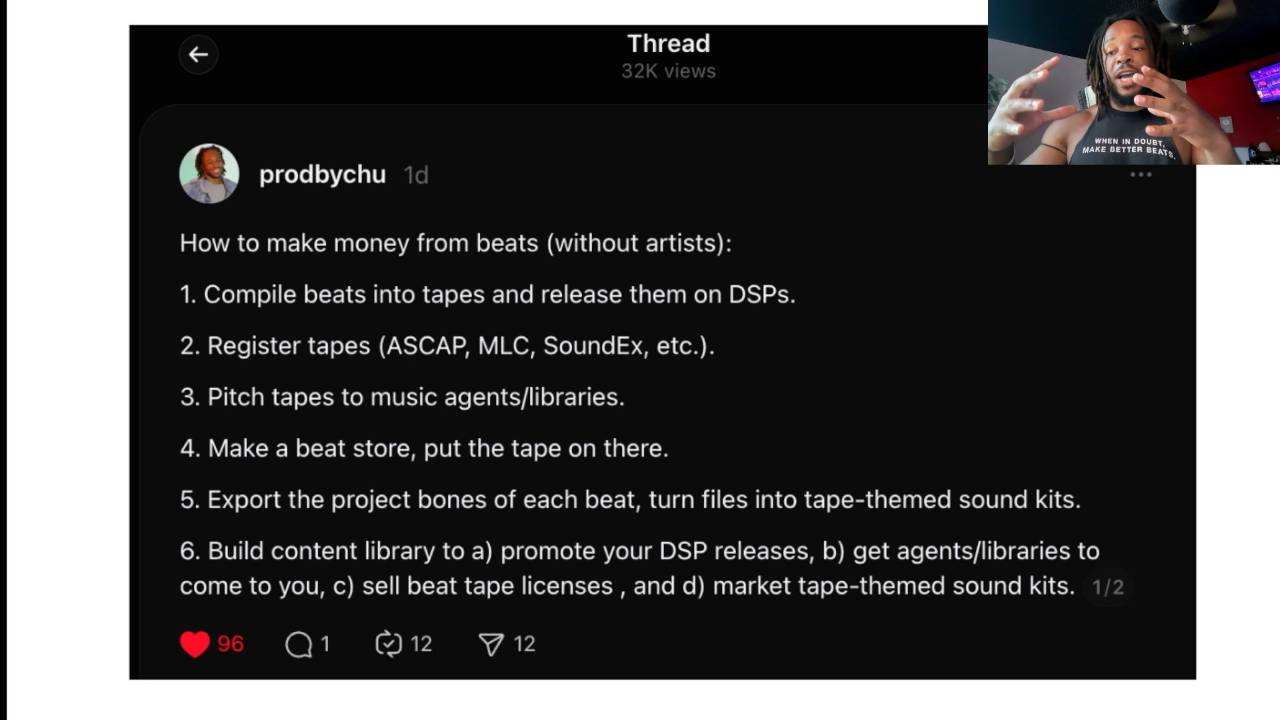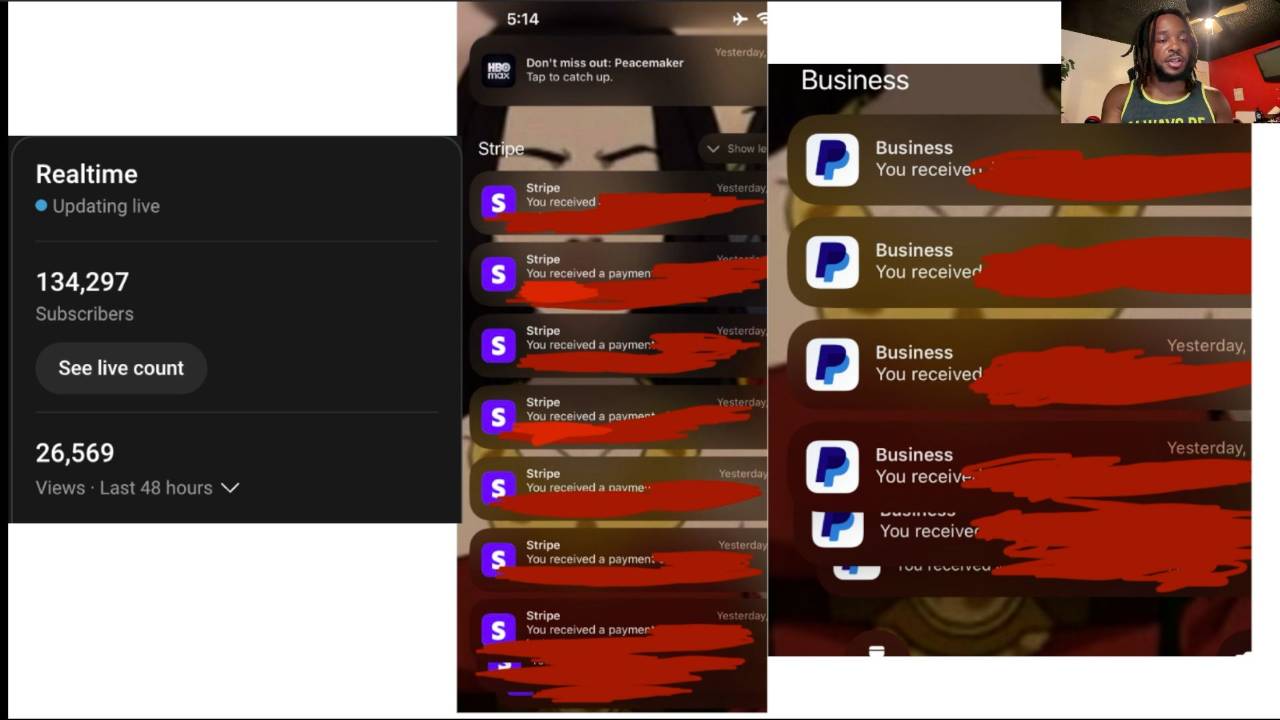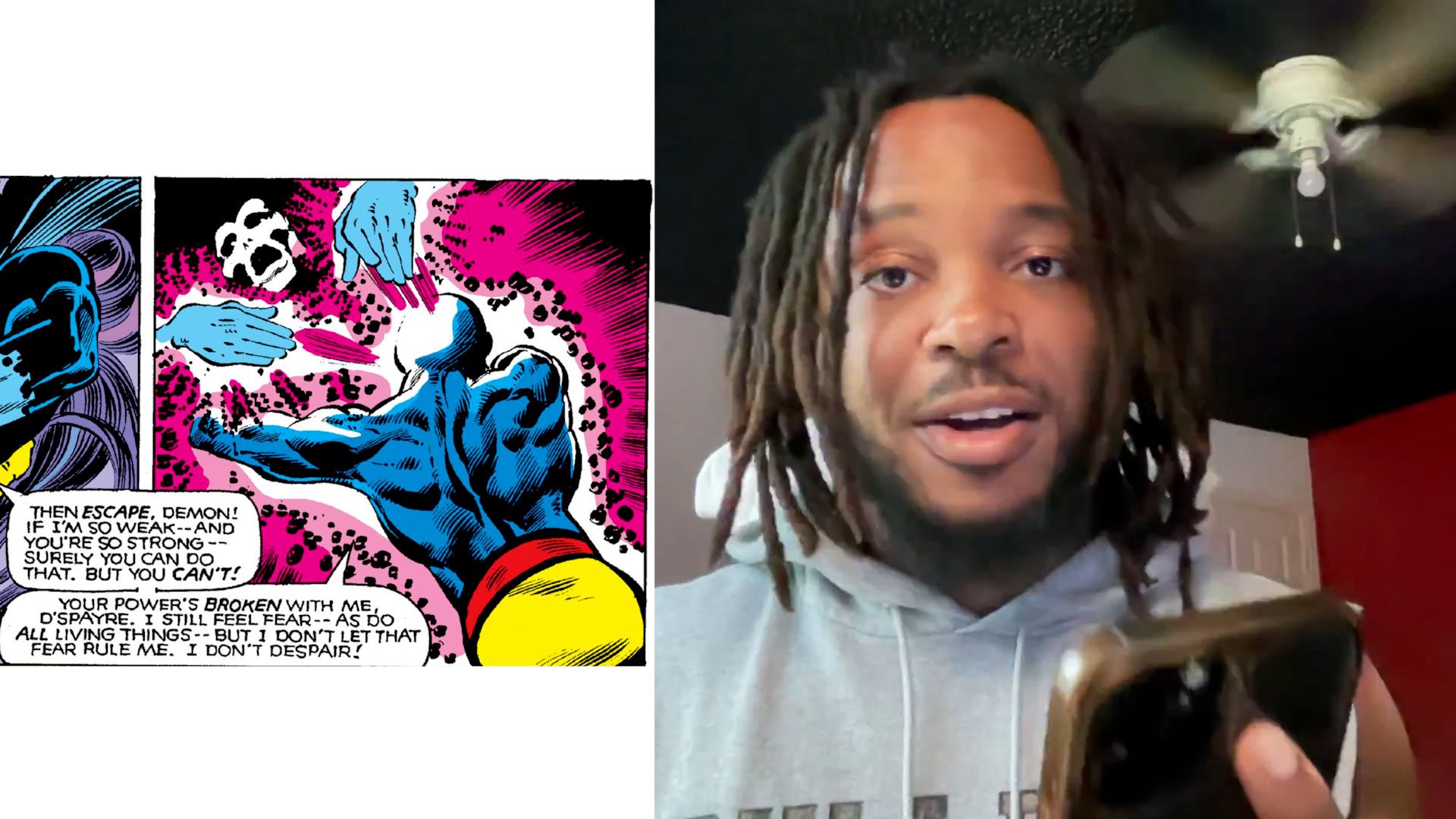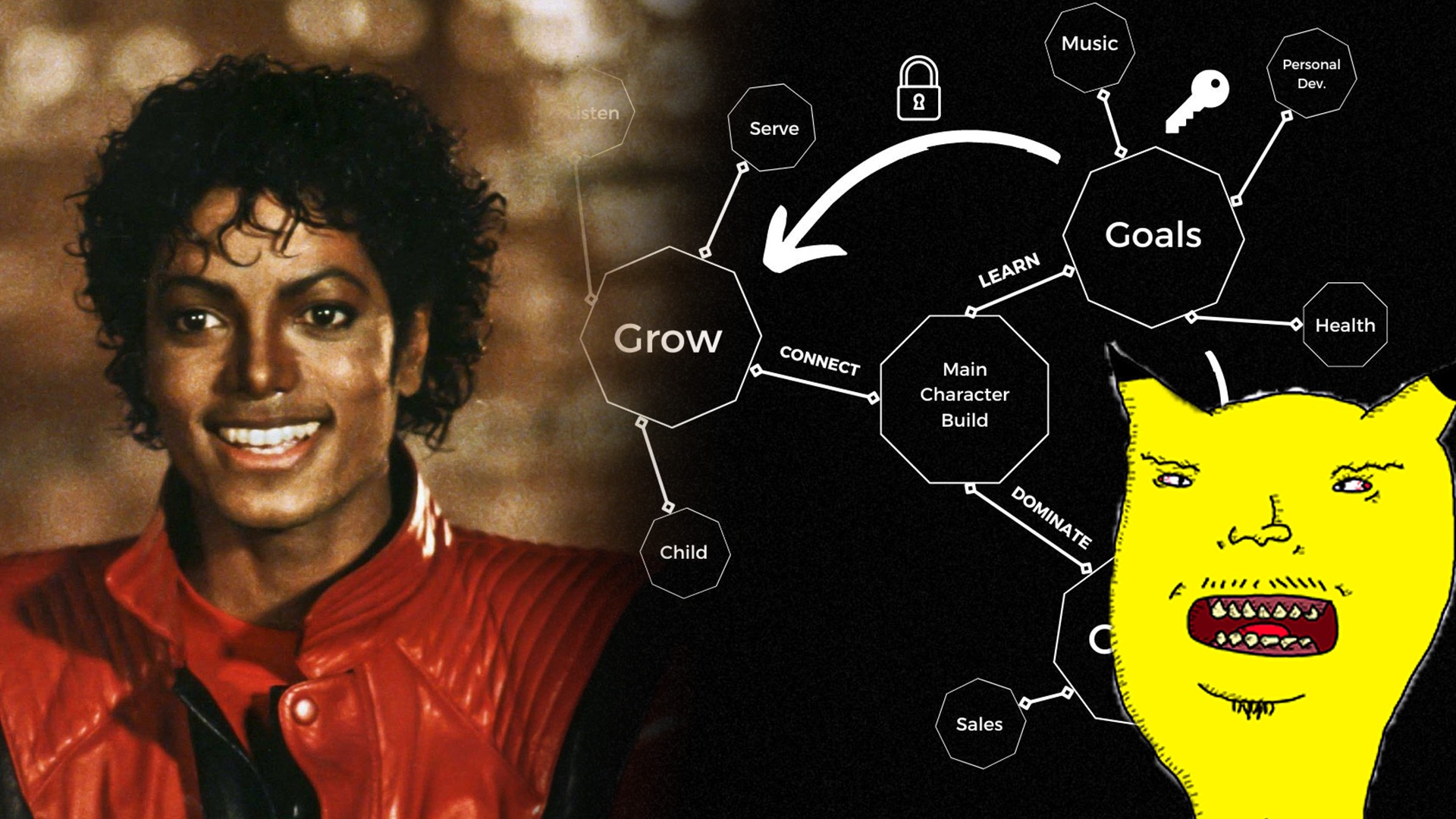
Art is science.
“I will be a perfectionist. A researcher, a trainer, a master.” - Michael Jackson, The Greatest Pop Star of all time.
It’s always been frustrating to me that so many people come into music thinking it should be easy.
Then get frustrated when it’s not.
Making the mistake of blaming some mystical force (like gatekeepers or market saturation).
Giving birth to all the bitching and complaining about market saturation.
This leads to the problem being compounded for people who want to do music for the right reasons.
No matter what any clickbait-y video tells you, here’s the truth:
It requires effort, dedication, perseverance, and planning.
If that turns you off, leave this page now.
It’s a tough journey.
A trek through a dense jungle.
Now, here’s the catch.
The crybabies whining about saturation think they can’t get through the jungle because of ghosts and spirits.
(Which don’t exist, except in their mind).
The clickbait-ers made it out of the jungle with sheer dumb luck and want to sell you on the idea of fast traveling through the jungle.
(Also doesn’t exist - unless your level is high enough to use fast travel).
I’m someone who makes thousands of dollars a month doing music production via methods like:
-
Beat sales
-
Publishing
-
Ad revenue
-
Syncs
-
Brand deals
-
Kit sales
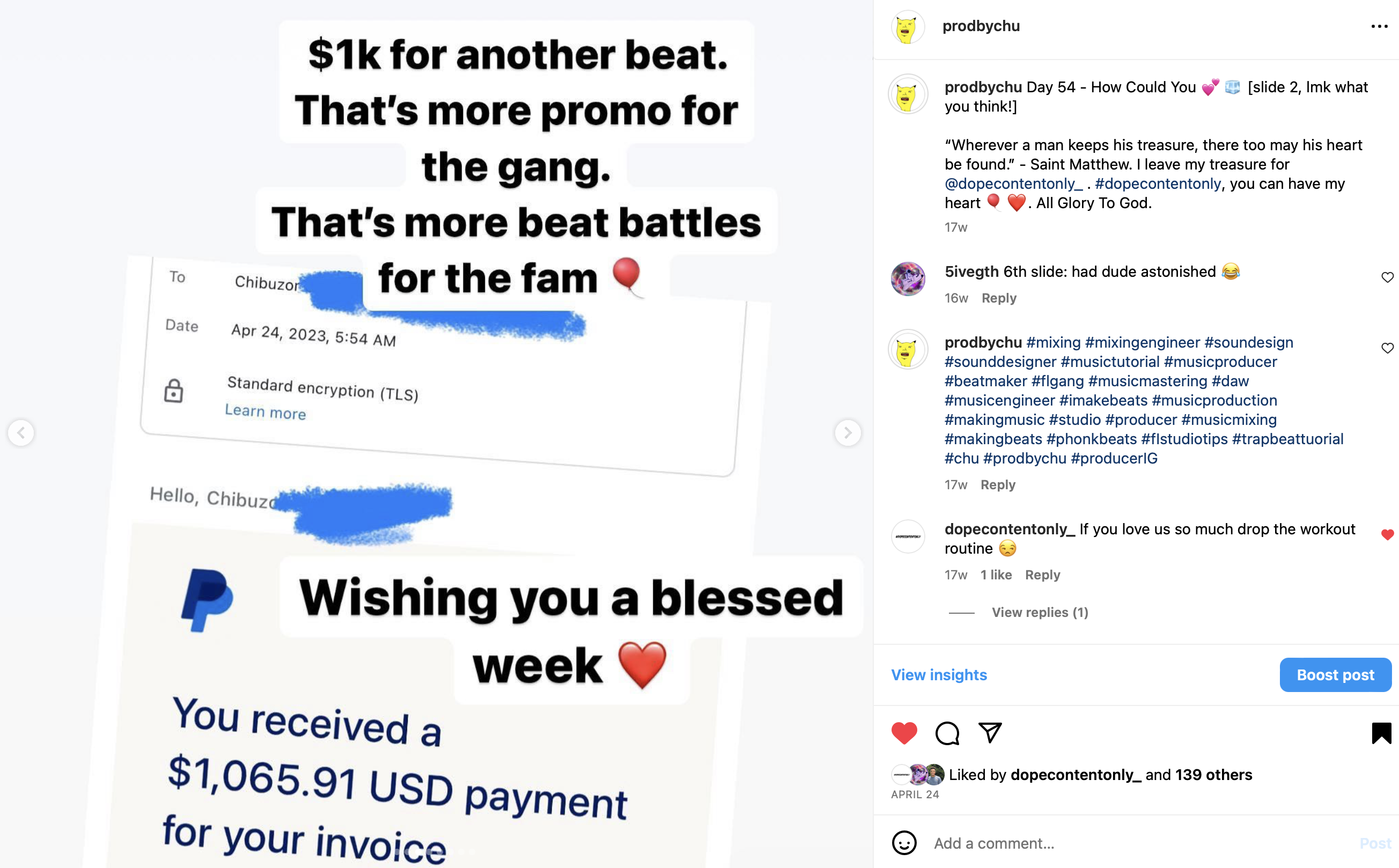
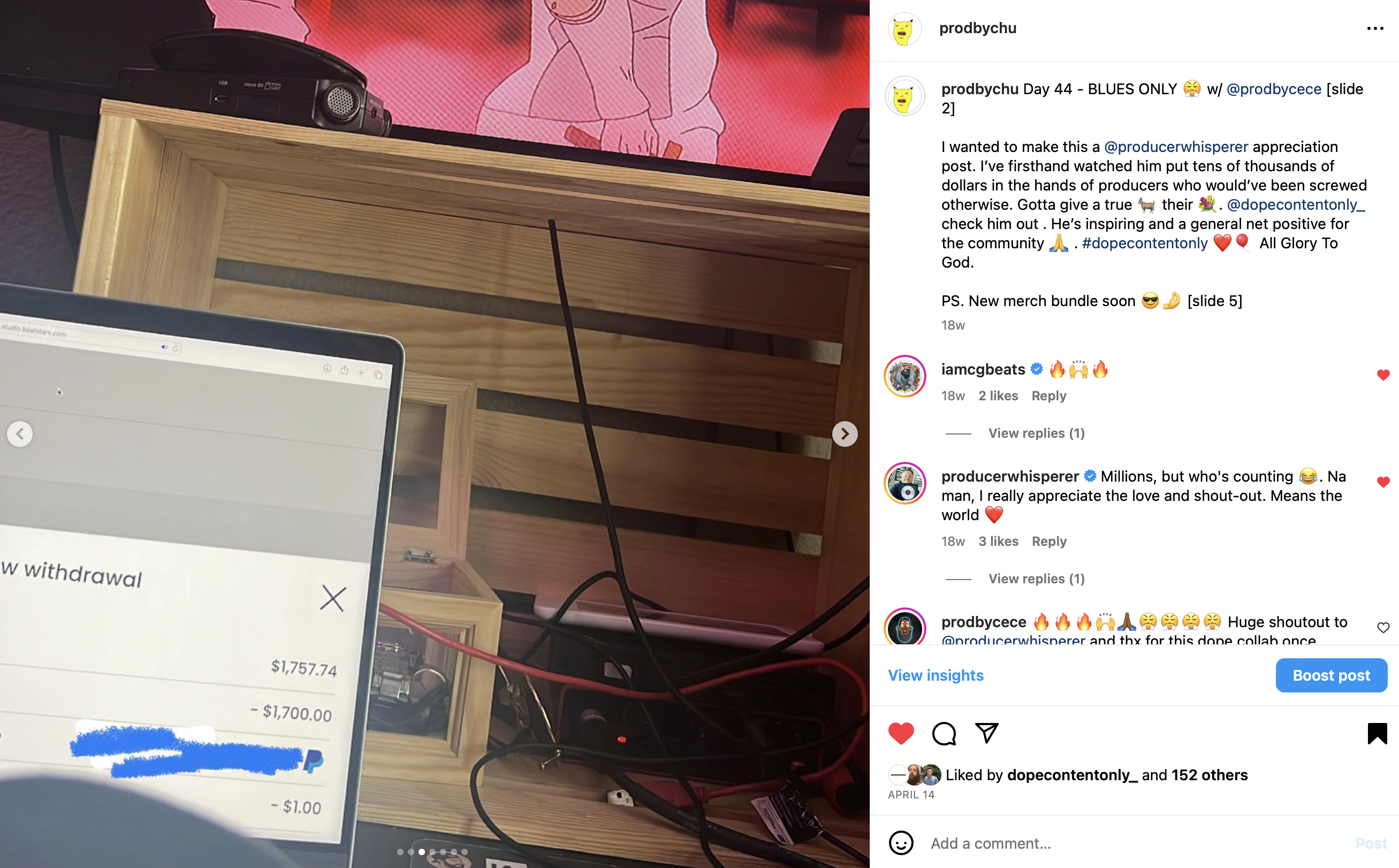
Here’s the truth.
-
You’re already in the jungle. Complaining won’t get you out.
-
Fast travel doesn’t work unless your level is high enough.
-
You shouldn’t bet on dumb luck.
To get through the jungle, you need 1) a map, and 2) some good trekking boots.
That’s what I want to give you in this newsletter (a map and some solid trekking gear).
I want to prepare you for the journey, so you have the best chance of making it through the jungle.
The jungle analogy is weird, I know.
So let’s try one that will make more sense.
It’s more likely that you become a physician than a career musician.
Not because music is necessarily a more difficult path.
(Though I was pre-med on track for med school at an Ivy League Institution, and I can tell you they compare in difficulty more than you’d think).
It’s because most people don’t view music as an endeavour that requires focused effort to be successful.
Successes are attributed to luck or talent, instead of work and effort.
But here’s the truth.
Music as a career is not for the weak.
If you understood the effort, time, and sacrifice it took, your POV would change.
Someone who cannot become a doctor because they keep failing the board exams does so because they don’t understand the material.
Why don’t we use this same line of thinking in music?
With that analogy in mind, picture me as a fourth-year med school student.
You are a wide-eyed first-year who doesn’t have a clue what’s going on.
I want to give you my study guide, tell you what classes to take, and what pitfalls to avoid.
It doesn’t guarantee you’ll pass - but it sure will increase your odds.
And as I hand you this guide, my friend, I want to tell you the secret that no other teacher or upperclassman is going to let you in on.
There is no luck (that’s the truth).
And natural born talent only gets you so far.
Even a pre-teenaged Michael Jackson knew he had to approach his future success with seriousness.
In a documentary, his estate legal advisor reveals this seriousness while reading notes MJ wrote as a child:
“This is dated November six, 1979. He was on the road with his brothers on the Destiny tour:
‘MJ will be my new name. No more Michael Jackson. I want a whole new character, a whole new look. I should be a totally different person. People should never think of me as the kid who sang ABC [or] I want you back.
I should be a new, incredible actor, singer, dancer. That will shock the world.
I will do no interviews. I will be magic. I will be a perfectionist. A researcher, a trainer, a master. I will be better than every great actor. Roped in one.
I must have the most incredible training system to dig and dig and dig until I find I will study and look back on the whole world of entertainment and perfected.
Take it steps further from where the greatest left off.’”
I don’t think any popstar in the last century had more natural born talent than MJ.
Yet…
He knew as a child that he needed to be “A researcher, a trainer, a master."
Need I say more?
Learn, Connect, Dominate.
“Discipline. Discipline. Like, really understand the word of ‘Discipline’.” - DeMar DeRozan, NBA All Star
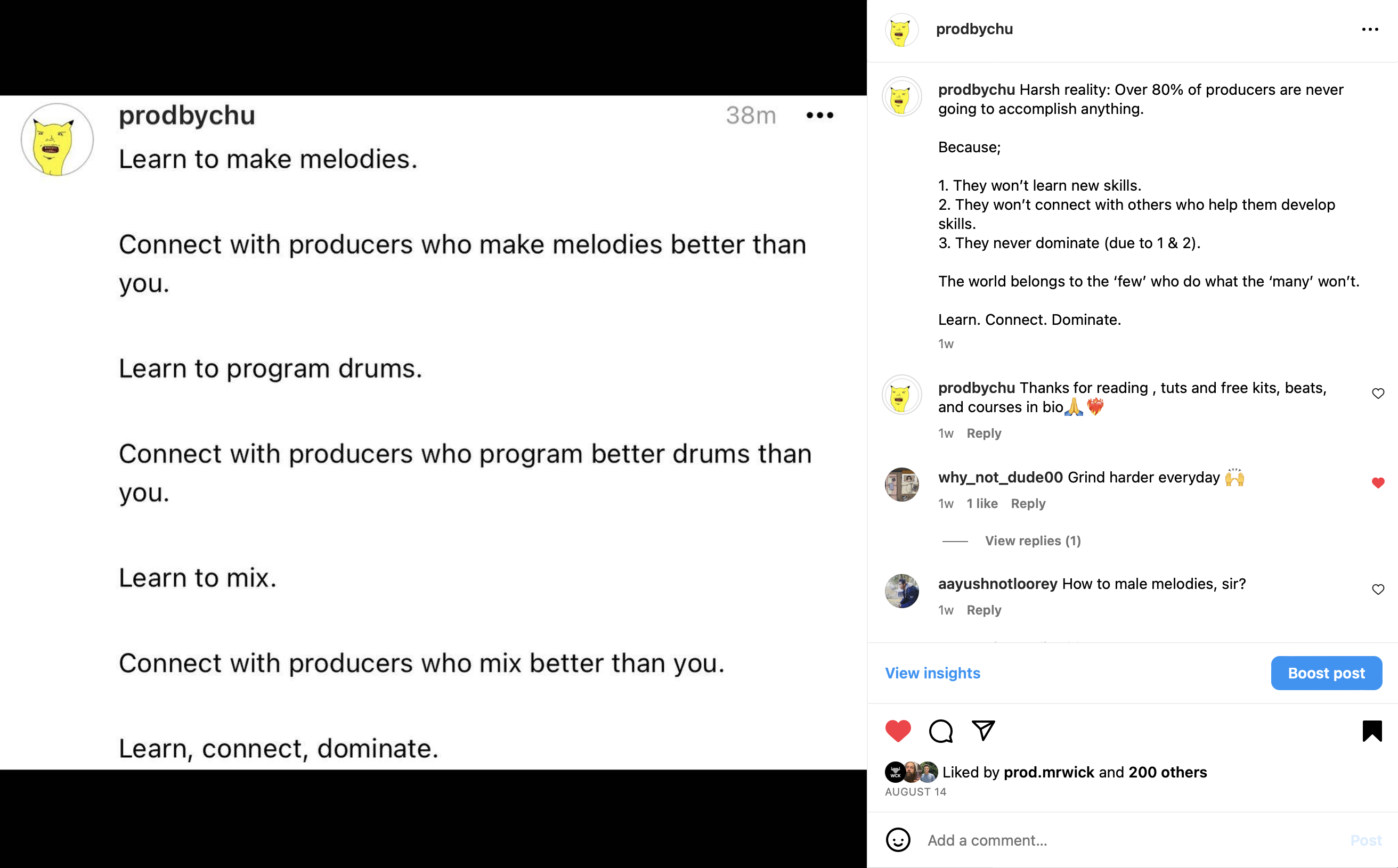
Three words from MJ’s prepubescent manifesto stick out to me.
Researcher. Trainer. Master.
These are things that MJ knew he had to become.
A prospective lawyer will not progress if they don’t ‘research’ the material.
They will not get far if they don’t ‘train’ their persuasion, arguments, and debating.
And they certainly won’t ‘master’ anything if they don’t research or train (hopefully it’s clear why, but leave me a comment if it’s not and I’ll try to explain).
Similarly.
A would-be music producer will not grow if they don’t ‘research’ how to make good music.
They will not be competitive if they never ‘train’ things like melody making and mixing.
And they certainly won’t ‘master’ anything if they don’t research or train.
We must become humble students if we hope to progress our music production careers.
The question isn’t - “Should we take an academic approach to music production?” (if it is for you, you’ve gone too far reading the wrong blog post, friend).
The question is - “How do we take the best academic approach to music production?”
The answer:
We learn.
We connect.
We dominate.
Learn (The ‘research’).
If you do not learn, you cannot become valuable.
If you do not become valuable, then no one is going to want to connect with you.
If no one connects with you, you will never dominate.
Learning is the foundation of the academic approach to being a music producer.
There’s a long list of things that we must be willing to learn at depth:
-
Drum programing
-
Mixing
-
Writing (IMPORTANT)
-
Basic marketing & sales
-
Content creation
-
A&R
-
Video editing
-
Photo editing
-
Web design
It takes effort on our part to develop these skills to a point where we can create value in the market.
NBA All Star DeMar DeRozan states it perfectly.
When asked “What’s the biggest advice you can give a young guy [just starting out in the NBA]” he responded:
“Discipline. Discipline. Like, really understand the word of ‘Discipline’.”
Why wouldn’t we approach our production careers with the vigor of a young prospect trying to make a name for themselves?
If you’re turned off by that idea, look no further for the cause of your lacking progress.
A medical student that doesn’t want to study anatomy and physiology will never become a doctor.
A producer who cannot learn basic important skills will never get far.
We must approach this as a physicist would their field.
We must be “researchers” (as MJ said).
This requires a necessary amount of commitment.
Similar to a prospective doctor, we accept that anything worth having is worth working hard for.
Connect (The ‘training’)
Connection comes after you’ve established an amount of internal value through learning.
Success in all its forms;
-
Money
-
Fame
-
Recognition
-
Accolades
-
Valuable relationships
-
Social media growth
flows towards value.
When you connect, you need to have something to give
Creating value is the only why to make money.
It’s karma.
Noob producers often complain about no one wanting to work with them.
What they’re really saying is - “I’m too lazy to figure out how to make working with me beneficial for everyone involved.”
Of course, we want to work with more artists and producers.
But we have to ask:
-
“What are they getting out of the deal?”
-
“What do I bring to the table so that it is a fair trade?”
-
“How can I give them more than I’m getting from them, ensuring that they will come back to me later?”
This is where the ‘training’ happens.
You are putting your learning into practice to see what works.
You’ll know that your learning is increasing your value if people want to connect with you.
“Connection” comes in many forms
-
Likes and shares on your content
-
People joining your email list
-
Producer and artist collaborations
-
Sales on valuable products like beats and kits
-
Comments on the general quality of your music and art
The depth of your training will increase as you connect.
Because the more you give, the more you get.
And the more you get, the better you become.
This leads to domination.
Dominate (The ‘mastery’)
Domination comes through confidence.
It’s a result of getting better (and your awareness of your ‘better-ness’).
You may not be a ‘master’ yet.
But you are basically a Jedi Master compared to where you were previously.
It’s not arrogance or pride in being better than anyone.
It’s excitement about how much better yo are now than when you started. When you noticed this, you can be sure the marketplace will too.
This indicates that you can dominate your current level and then move up to the next.
Let’s talk about how you’ll do that using the music producer skill tree (and stat-maxing it).
The Music Producer Skill Tree
"What prevents people from learning… is not the subject itself - the human mind has limitless capabilities - but rather certain learning disabilities that tend to fester and grow in our minds as we get older." - Robert Greene, Best Selling Author.
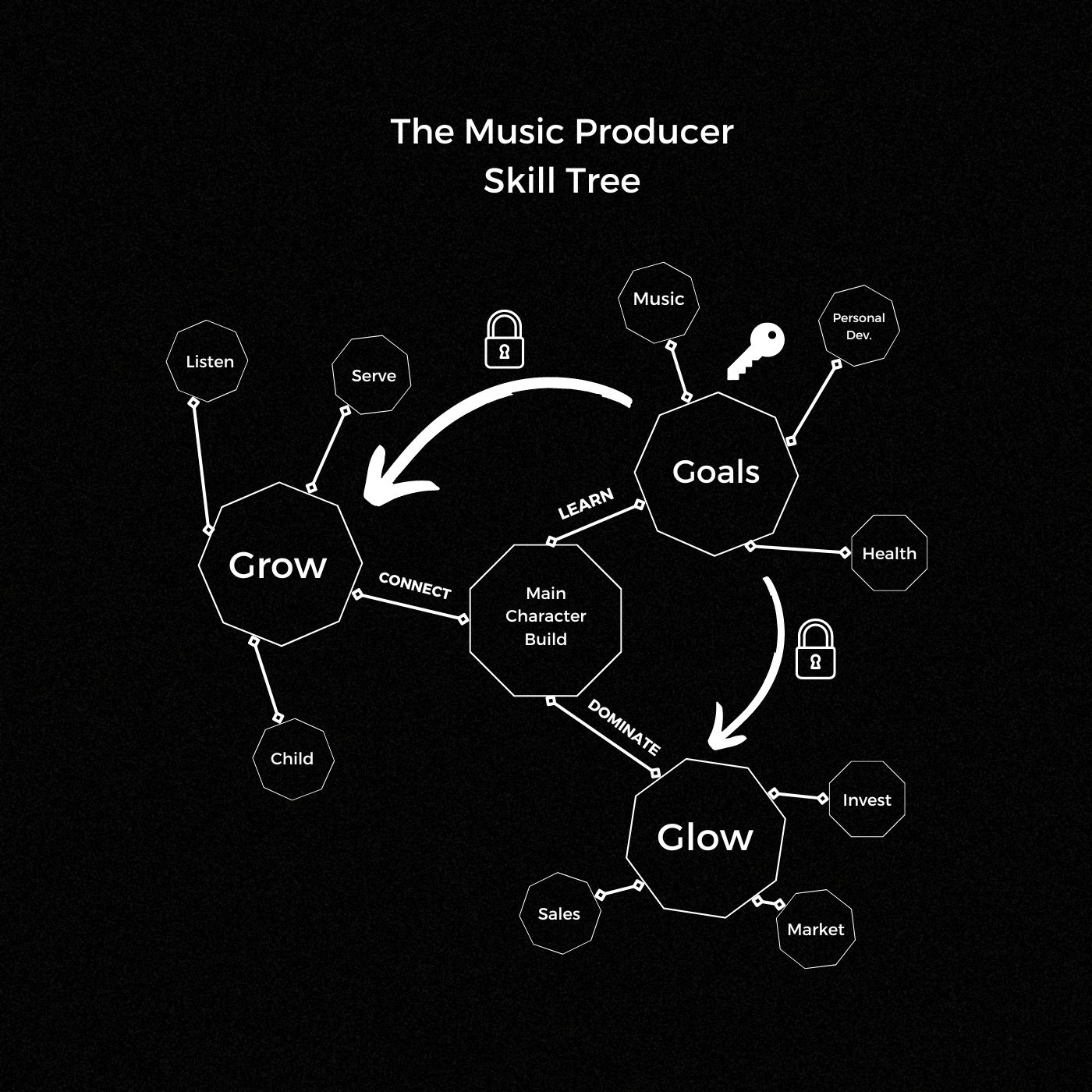
The music producer Skill tree has 3 main branches;
-
Learn
-
Connect
-
Dominate
We’ve covered what each branch is (and their individual importance).
Now let’s discuss stat development.
1 - Goal (The Learning Branch)
This is the most important skill.
Just like none of the other branches matter if you learn nothing.
None of the skills can be unlocked without setting goals.
This means that you don’t just learn haphazardly.
You set a goal for what you want to learn (and understand why).
Saying you “want to be the best” is not a goal.
That is an idea.
A goal is something you can tangibly achieve by creating a plan.
Here is a list of things that ARE goals;
-
Learning basic chord theory in 6 months
-
Improving mixing quality by the end of the year
-
Getting your YouTube Channel monetized
-
Posting 1 beat tape per month for the next 2 years
-
Gaining 1000 followers across all social media by the end of the year
-
Getting your first ever beat/kit sale
-
Getting your first mixing client
Here are things that ARE NOT goals;
-
Wanting to be the best producer ever
-
Wanting to make $1 million
-
Wanting to get placements with Lil Baby and Travis Scott
-
‘Blowing up’ on social media
Goals have clearly defined parameters (and they are things you can make a plan for).
I can plan out how I’m going to get monetized on YouTube in the next year.
I cannot plan out how I’m going to get a Lil Baby placement.
I can plan how I’ll learn to make my beats more attractive to artists.
I cannot plan out if artists will respond to my cold DM spam.
For further clarity, let’s use my career as an example (keep in mind I’m a solo act that does everything in-house).
The primary goal I had when I began my career was growing my personal brand so that I can work directly with established artists.
This was always my thought process.
I knew it’d be far more likely that I’d build an attractive producer brand than:
-
Get a lucky first placement big enough to attract more (one placement isn’t enough to quit your day job)
-
Get signed
-
Join some random producer group
-
Get enough placements to live on publishing alone
Based on my goal, I determined that the skills I needed to learn were:
-
Melody making
-
Sampling
-
Mixing
-
Networking
-
Self discipline (patience, emotional control, physical fitness)
-
Writing
-
Public speaking
-
A&R
-
Basic sales and marketing
Then I began my learning (my ‘research’).
Once I’d built a decent amount of skill through honest practice, I moved on to the next branch
(Note: I still develop the Learning and Goals area of the skill tree - this never stops).
2 - Grow (The Connection Branch)
A solid set of goals unlocks the rest of the skill tree (‘Grow’, ‘Glow’).
It’s best to flow from the ‘Learn’ to the ‘Connect’ branch into the ‘Grow’ skill.
This is where you’re going to get feedback.
You’re going to find out if what you’re learning is worth a damn.
There are 3 important sub branches on the Grow skill:
-
Child-like eagerness and humility
-
The desire to listen to problems and helpful suggestions
-
A willingness to serve
There’s no way to grow your learned skills without the humility of a child (forget about learning at all if you aren’t eager like a child).
Robert Greene captures this perfectly in his book “The Mastery”:
"What prevents people from learning… is not the subject itself - the human mind has limitless capabilities - but rather certain learning disabilities that tend to fester and grow in our minds as we get older… If we feel like we know something, our minds close off to other possibilities… For that purpose you must try to revert to a childlike feeling of inferiority - the feeling that others know much more than you and that you are dependent upon them to learn and safely navigate your apprenticeship.”
Listening is crucial because:
-
You need to find out how your skills solve problems (otherwise; they aren’t valuable)
-
You need to be open to feedback (but be able to filter good feedback from the useless).
Service is a fundamental requirement.
It’s okay to want money or fame.
Use that as something to motivate you towards service. The more people you serve overall, the more success will come your way.
Remember. Success flows toward value. Service tailored to solve a specific problem is highly valuable.
Let’s continue the example form early (use me as a case study).
Once I felt comfortable enough in my skill, I started posting beats online for free use.
Rappers needed good beats.
Low tier producers were taxing for trash.
I saw a problem and moved to solve it (this problem is worse now).
This also allowed me to connect with rappers and get direct feedback.
When I was just giving out beats for free, the ‘sale’ was whether they used it.
If they didn’t use it, I always asked why.
Their feedback helped me improve my beats.
And this got me to where I could sell them for money (which led to sales and placements).
This was proof that my skills were ‘worth a damn.’
Then I doubled down on service, focusing my attention on the producer community.
I made lessons on the techniques that helped me get better and posted them for free on YouTube.
This allowed me to connect with and serve thousands of producers (and helped grow my brand).
Then I made kits with sounds I knew were good (because they were getting me sales and placements).
And I gave those away for free too - like the 4TEEN Drum Kit.
Once I knew my kits were good, I made more quality versions to sell to producers who wanted my exact sounds, mixer presets, and private lessons.
All of this led to brand growth.
The better I get, the more people I can help.
The more people I help, the bigger I grow.
The bigger I grow, the more established are the artists I’m able to reach (The Goal).
3 - Glow (The Domination Branch)
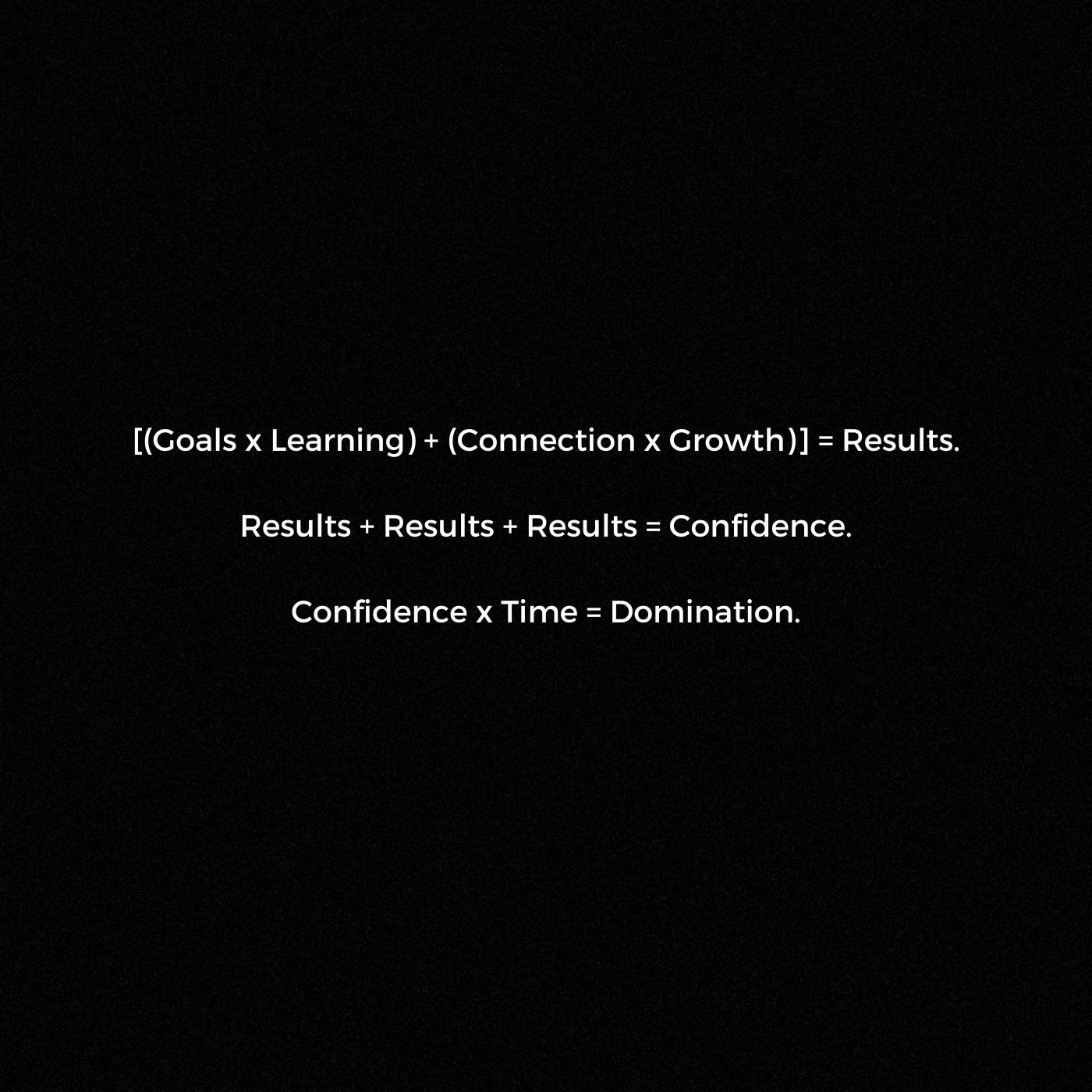
This is where you pour the gas on.
That’s done through marketing yourself more because you have results.
[(Goals x Learning) + (Connection x Growth)] = Results.
Results + Results + Results = Confidence.
Confidence x Time = Domination.
When you’re more confident, you essentially let your nuts (or ovaries) hang.
This works best when part of your learning is based on mastering the fundamentals of marketing. That’s why there’s an arrow going straight from ‘Goal’ to ‘Glow’ - your goals should assume success (and future domination).
The key here is to repeat successful results (Results + Results + Results = Confidence).
When you find something that works, stick with it no matter what.
Every popular creative is known for a few key traits. None are jacks-of-all-trades.
If you’re getting 4 likes every post and then suddenly you get 20 on one, you need to examine that.
And then run it into the ground.
Figure out if that leads to “your thing.”
Your sound. Your style.
Whatever.
As long as it’s helping you grow, keep doing it.
A small group will grieve you for doing the same thing over and over.
But, we aren’t marketing to drive-by haters.
We are creating value for our repeat consumers.
We do this through the repetition of ideas related to a niche set of topics.
That’s why I have multiple ‘placements’ with the same few artists (DizzyEight, Yanga Chief, etc.)
And that’s why my content usually covers a narrow range of topics (melodies, mixing).
I’m not interested in spreading myself thin for the sake of it.
The market will let me know which of my works are the most valuable.
Then from there it’s up to me to keep feeding them what they want so they keep getting value.
Set goals.
Figure out what you need to learn to achieve those goals.
Test your learned skills - if they cause people to connect with you, then you’re on the right track.
When you find something that works, stick with it.
Learn, connect, dominate.
Blessings,
Darth Chu
Get Sound Kits 👇


